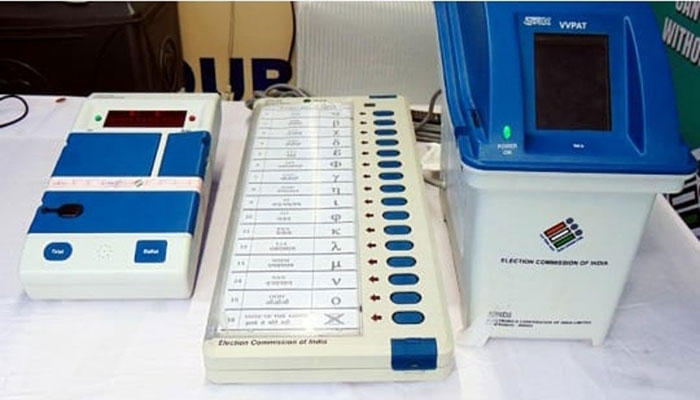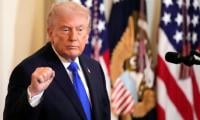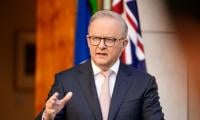Hundreds of thousands of EVMs required unavailable: How can EVMs be used in Punjab local elections to be held in three months?
ISLAMABAD: When electronic voting machines (EVMs) are not currently available in bulk or even in a small quantity for use in general elections, they will clearly not be at hand for the Punjab local government elections to be held in the first quarter of next year.
Additionally, it is the function of the Election Commission of Pakistan (ECP) under the Constitution and the relevant law to procure the EVMs and decide whether to use them in the entire parliamentary polls, local elections or on an experimental basis in chosen areas.
The Punjab government’s announcement that it is going to incorporate in the new local council law a clause for the use of EVMs in the forthcoming elections is a mere declaration like so many others because the equipment is not readily obtainable.
Federal Science & Technology Minister Shibli Faraz has also nailed the provincial assertion by stating that the locally made and globally available EVMs are not designed for the type of local elections held in Pakistan. “The EVMs can be used only for direct elections of districts and tehsils where the panels of contestants are in the race. In our system, there are multiple panels for different types of seats for which the EVMs are not designed.”
The Punjab’s statement was also part of the pressure being mounted on the ECP to hold the general elections through EVMs. The ECP has sought funding from the federal government to establish an elaborate set-up including spacious premises, storage places, technical training of personnel etc., to prepare for acquisition of the EVMs. Federal Information Minister Fawad Chaudhry has announced that the government will provide the funds to the ECP.
When the issue of using the EVMs in the general elections has not yet been conclusively settled despite the requisite legislation having been done, it appears quite impossible that the machines will be available for the Punjab local polls.
The central law approved by the joint session of parliament provides for the use of the EVMs in the general elections, which is a legal cover to the ECP for such an exercise. Necessary amendments are called for in the provincial laws accordingly for the same purpose as it is the ECP’s duty to hold local polls as well.
Experts point out that nearly 800,000 EVMs would have to be purchased for the parliamentary polls. The same machines can be used for the local polls only if they are available and are fit for operation for another round of elections.
Under the procurement rules, the ECP needs to go through a protracted process to reach the stage where it will be in a position to order the manufacturing of the recommended EVMs at home or abroad within a certain time-frame about which nothing is known at the moment.
The ECP’s first and foremost step is its principal decision to use the EVMs in the entire general elections and not in some or several selected constituencies on trial basis. When it will be satisfied that a host of shortcomings and deficiencies pinpointed in the EVMs, like the lack of secrecy and transparency, can be taken care of to protect the voters’ rights, it will move ahead.
Then, the ECP will call local and international manufacturers of EVMs for presentations and demonstrations of the equipment, highlighting its efficacy, efficiency and failsafe operations and functioning. It will evaluate the technical and production capacity of such companies to know whether they can manufacture the EVMs in a huge quantity in the given time limit and whether their machines will come up to the mark. The next stage will be to float tenders for Pakistani and foreign firms to buy the EVMs in bulk.
A long time will be consumed by all these several stages and it will be not be less than a miracle if the ECP is able to get the required number of EVMs for use in the next general elections to be held in the third quarter of 2023 if all goes well and if they are organised on the appointed time after completion of the five-year term of the assemblies.
At the same time, the judgment of a superior court where the law providing for the EVMs and i-voting for overseas Pakistani has been challenged will also have to be kept in view. Despite the fact that the government has made the law, the ECP is expected to submit to the court its independent opinion on the use of EVMs and i-voting for Pakistani expatriates. This view is unlikely to be different from what it has already made public more than once.
Keeping the ECP views and the stand taken by the opposition parties on the EVMs and i-voting, the government had gone ahead in unilaterally passing the law in a joint parliamentary session. It has repeatedly stated that the primary objective of the legislation was to ensure that nobody raises accusing fingers at the results of the next elections.
However, considering the large-scale opposition to the law, the future parliamentary polls using EVMs have become controversial even now, several months before they are held.
-
 British Royals ‘not Appreciated’ In Modern World, Says Author
British Royals ‘not Appreciated’ In Modern World, Says Author -
 Applebees Closures Expand With Glenville Restaurant Closing For Good After 10 Years
Applebees Closures Expand With Glenville Restaurant Closing For Good After 10 Years -
 Louvre Director Resigns After Historic Jewelry Heist Exposed Security Flaws
Louvre Director Resigns After Historic Jewelry Heist Exposed Security Flaws -
 Mike Johnson Presents George Washington's Gavel For First Time At State Of Union
Mike Johnson Presents George Washington's Gavel For First Time At State Of Union -
 Mexico Travel Warning: What You Need To Know As Airlines Resume Flights To Mexican Cities
Mexico Travel Warning: What You Need To Know As Airlines Resume Flights To Mexican Cities -
 Jamie Lee Curtis Mourns Death Of Ex-boyfriend Robert Carradine: 'He Was My First Crush'
Jamie Lee Curtis Mourns Death Of Ex-boyfriend Robert Carradine: 'He Was My First Crush' -
 Andrew Mountbatten Windsor Worried About Wrong Things In New Home
Andrew Mountbatten Windsor Worried About Wrong Things In New Home -
 Jack Hughes Speaks Out As Jake Guentzel, And Team USA Push Back On State Of The Union Backlash
Jack Hughes Speaks Out As Jake Guentzel, And Team USA Push Back On State Of The Union Backlash -
 Shamed Andrew Got ‘massages’ Over Royal Money, Says Victim
Shamed Andrew Got ‘massages’ Over Royal Money, Says Victim -
 Justin Trudeau's Son Breaks Silence On Katy Perry Romance
Justin Trudeau's Son Breaks Silence On Katy Perry Romance -
 Zachery Ty Bryan Sentenced To 16 Months In Jail After Pleading Guilty To DUI
Zachery Ty Bryan Sentenced To 16 Months In Jail After Pleading Guilty To DUI -
 'Your Friends & Neighbors' Star Jon Hamm Reacts To His Viral Dancing Meme
'Your Friends & Neighbors' Star Jon Hamm Reacts To His Viral Dancing Meme -
 Anthropic Unveils New AI Tools Weeks After Legal Plug-in Rattled Markets
Anthropic Unveils New AI Tools Weeks After Legal Plug-in Rattled Markets -
 Osheaga 2026 Lineup Revealed With Tate McRae, Lorde And Twenty One Pilots
Osheaga 2026 Lineup Revealed With Tate McRae, Lorde And Twenty One Pilots -
 Prince Harry, Meghan Markle Markle Training Beatrice, Eugenie For Tell-all
Prince Harry, Meghan Markle Markle Training Beatrice, Eugenie For Tell-all -
 Chris Hemsworth Reveals Real Reason He Quit Hollywood Life For Melbourne
Chris Hemsworth Reveals Real Reason He Quit Hollywood Life For Melbourne




